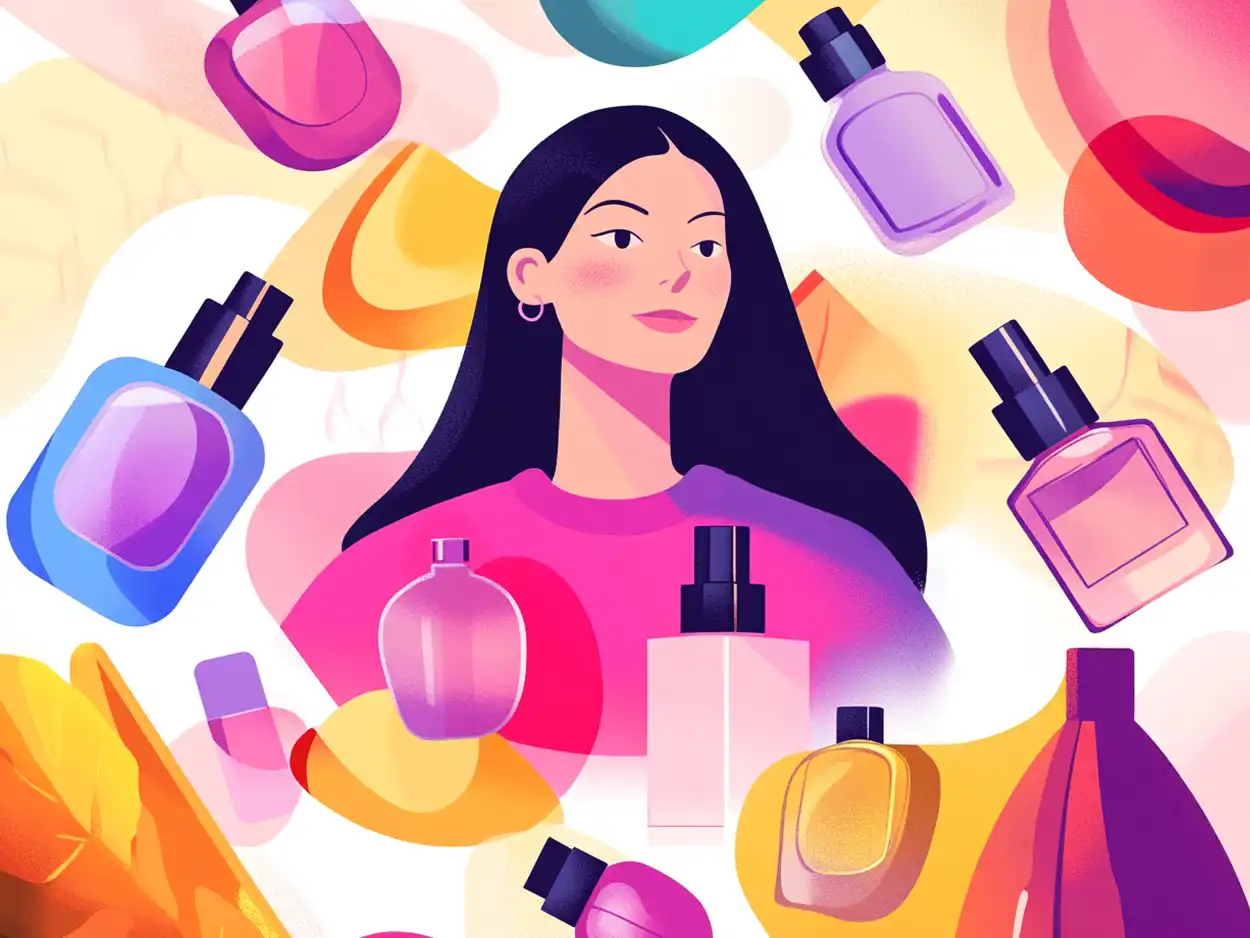Is your growing fragrance collection a harmless hobby or a sign of something more concerning? This article delves into the psychology behind perfume obsessions and explores the fine line between passion and compulsion. We’ll examine the allure of fragrances, the impact of marketing, and offer strategies for maintaining a healthy relationship with your scent collection.
The Captivating World of Perfumes
You’ve probably experienced it before – that moment when you spritz a new fragrance and feel instantly transported. Perhaps it’s to a sun-drenched beach, a cozy winter evening, or a magical night out. Perfumes have an uncanny ability to evoke emotions and memories, making them far more than just pleasant scents.
This emotional connection is what draws many of us into the world of fragrances. Each bottle holds the promise of a new experience, a fresh identity, or a boost of confidence. It’s no wonder that fragrance enthusiasts often find themselves with ever-growing collections.
But what is it about perfumes that captivates us so deeply? The answer lies in the complex interplay between scent and emotion. Our olfactory system is directly linked to the parts of our brain that process emotions and memories. This means that a single whiff can trigger a cascade of feelings and recollections, often without us even realizing it.
Moreover, fragrances offer a unique form of self-expression. Like clothing or accessories, the scent you choose to wear can say a lot about your personality, mood, or the image you want to project. This versatility is part of what makes collecting fragrances so appealing – you can have a different scent for every occasion or mood.
The Psychology of Fragrance Collecting
Delving deeper into the world of fragrance collecting reveals fascinating psychological underpinnings. For many, it’s not just about owning multiple scents – it’s about the thrill of the hunt, the joy of discovery, and the satisfaction of curating a personal collection.
Collecting fragrances can be seen as a form of self-actualization. Each new acquisition represents not just a new scent, but a new facet of your identity or a potential future self. That fresh, crisp cologne might embody the successful professional you aspire to be, while a sultry, spicy perfume could represent your more daring, adventurous side.
There’s also a strong element of nostalgia involved in fragrance collecting. Many collectors speak of certain perfumes transporting them back to specific moments in their lives. This ability to “bottle” memories and emotions is incredibly powerful and can make letting go of fragrances difficult, even if they’re no longer worn regularly.
The act of collecting itself can be psychologically rewarding. There’s a sense of accomplishment in finding that rare, discontinued scent or in amassing a comprehensive collection from a particular brand or perfumer. This can boost self-esteem and provide a sense of expertise and connoisseurship.
For some collectors, the pursuit of completeness can become all-consuming. When a favorite brand releases a new fragrance or a flanker to a beloved scent, there’s often a feeling of obligation to add it to the collection. This drive for completeness can lead to purchasing fragrances simply to “fill gaps” in a collection, rather than because of genuine interest in the scent itself.
However, it’s important to recognize that collecting can sometimes cross the line from hobby to compulsion. The temporary high of a new purchase can be addictive, leading some to buy more fragrances than they can reasonably use or afford. This is where the question arises: is your fragrance addiction actually a shopping addiction in disguise?
When Passion Becomes Compulsion
Your love for fragrances can start innocently enough. A signature scent leads to a small collection, which grows into a diverse array of options for every mood and occasion. But how do you know when your perfume passion has crossed the line into problematic territory?
One key sign is when your fragrance purchases begin to outpace your ability to use them. If you find yourself constantly buying new scents while barely touching the ones you already own, it might be time to pause and reflect. Another red flag is when fragrance shopping starts to interfere with other aspects of your life, such as your finances or relationships.
Pay attention to your emotional state when buying fragrances. Are you purchasing them primarily for the temporary high or to alleviate negative emotions? If you find yourself turning to fragrance shopping as a way to cope with stress, anxiety, or depression, it could indicate a deeper issue.
Guilt and secrecy are also telltale signs of compulsive shopping. If you’re hiding purchases from loved ones or feeling ashamed about your growing collection, it’s worth examining your motivations more closely. Remember, there’s no shame in seeking help if you feel your fragrance hobby has become unmanageable.
How Marketing Fuels Our Fragrance Obsessions
The fragrance industry is a master of seduction, employing sophisticated marketing techniques to keep us coming back for more. Understanding these strategies can help you make more mindful choices about your perfume purchases.
Limited editions and seasonal releases are powerful tools in the fragrance marketer’s arsenal. These create a sense of urgency and exclusivity, prompting you to buy now or risk missing out forever. The fear of missing out (FOMO) can be a strong motivator, even if you don’t particularly need or want the fragrance in question.
Celebrity endorsements and designer collaborations tap into our desire for status and association. When your favorite actor or fashion house releases a new scent, it’s not just a perfume you’re buying – it’s a piece of their perceived glamour and success. This emotional connection can make the purchase feel more justified, even if it’s not a scent you’d normally choose.
The power of packaging shouldn’t be underestimated. Luxurious bottles and elaborate boxes appeal to our aesthetic senses and can make the act of purchasing feel more special. Some collectors even admit to buying fragrances primarily for their beautiful bottles, regardless of the scent inside.
Social media and influencer marketing have added new dimensions to fragrance promotion. Seeing your favorite beauty guru rave about a new release can create a powerful urge to try it yourself. The constant stream of new products and reviews can also fuel a sense of always needing to keep up with the latest trends.
Loyalty programs and gifts with purchase are other tactics that can encourage overconsumption. While these can offer good value, they can also lead you to buy more than you intended just to reach a certain spending threshold or receive a coveted gift.
Embrace Mindful Fragrance Appreciation!
You don’t have to give up your love for fragrances to avoid the pitfalls of addiction. Instead, consider adopting a more mindful approach to your perfume passion. Start by taking inventory of your current collection. Really spend time with each scent, reconnecting with why you were drawn to it in the first place.
When you feel the urge to buy a new fragrance, try implementing a waiting period. Give yourself a week or two to consider whether you truly want and need the scent. This can help differentiate between genuine excitement and impulsive desire.
Consider exploring your passion in ways that don’t involve purchasing. Visit perfume counters to sample new scents without buying. Attend fragrance workshops or talks to deepen your knowledge. Join online communities to discuss and appreciate perfumes with like-minded enthusiasts.
Focus on quality over quantity. Instead of amassing a large collection, curate a smaller selection of fragrances that truly resonate with you. This might mean investing in higher-quality, niche perfumes that offer unique experiences rather than buying numerous mainstream scents.
Rotate your fragrances regularly to rediscover old favorites. You might be surprised by how much you enjoy a scent you’d forgotten about. This practice can help curb the desire for constant newness that often fuels over-purchasing.
Set clear boundaries for your fragrance hobby. This could involve creating a budget, limiting purchases to special occasions, or implementing a one-in-one-out policy where you only buy a new fragrance after finishing or decluttering an existing one.

